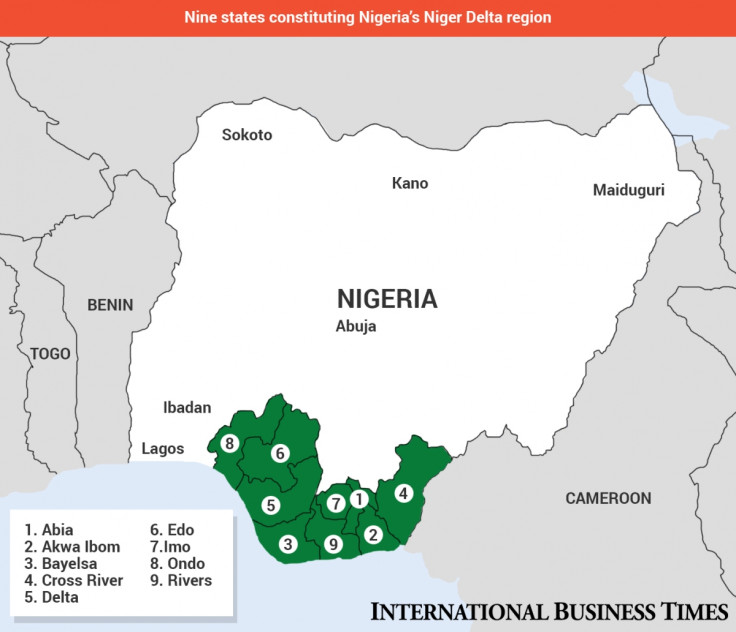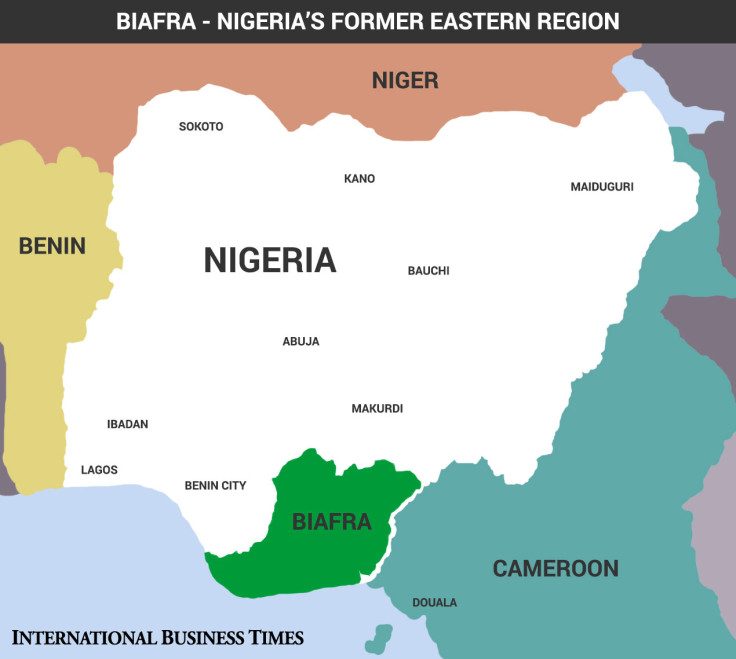Nigeria: Pro-Biafrans 'the next Boko Haram' if they join forces with Niger Delta militants

Nigerian supporters of the reinstatement of the Republic of Biafra – territories independent from Nigeria from 1967 until 1970 and re-annexed to the African nation following a civil war that killed between one and three million people – might be joining forces with militants from the Niger Delta, southern Nigeria, an intelligence group has warned.
Origins of militant groups in Niger Delta

Niger Delta's militant groups originated in the early 2000s following the deterioration of the living conditions of people living in oil-rich areas due to the increase of oil-related activities by foreign oil corporations. Tensions between foreign oil corporations in the region and local communities arose as some ethnic groups felt they were being exploited and could not benefit by the presence of oil in the area.
Groups include: Niger Delta People's Volunteer Force (NDPVF), Niger Delta Vigilante (NDV) and The Niger Delta Liberation Front (NDLF).
David Otto, CEO of UK-based global security provider TGS Intelligence Consultants, said there are fears that the organisation is "gearing up to seek for a secession".
Otto also said that following the election of president Muhammadu Buhari, a northerner, in May, the issue of Biafra has gathered more momentum. He explained: "In Nigeria, when there is a northerner in power, there are problems in the south and vice-versa. The purpose of this is usually to destabilise the president who is in power at that time.
"Biafrans are now looking for a trigger, they are looking for maybe someone who gets shot, that is why now they are claiming that police are shooting them."
Referring to two episodes, which occurred on 30 August and 6 September, when pro-Biafrans organised marches and alleged that the police shot and killed some demonstrators, Otto said: "If you organise a protest in a state within a state asking for secession, the police have the authority to dislodge such a movement.
"We have heard reports that police have shot on the crowd on 6 September and one person was reported dead. But you will never get the exact number of casualties neither from the police nor from the protesters. Most of the times, for you to know whether the group was armed or not, is if that group actually shot one of the policemen. In the case of 30 August, none of the police members was injured."
Pro-Biafrans can become the next Boko Haram
Otto said pro-Biafrans can become like terror group Boko Haram, which carries out attacks primarily in northern Nigeria and Cameroon, and aims to establish an Islamic caliphate throughout the occupied territories.
Biafra history

After the end of the British rule in 1960, Nigeria consisted of territories that were not part of the nation before the colonisation, resulting in escalating tensions among the communities.
People in the Eastern Region - a former federal division of Nigeria with capital Enugu - mainly from the Igbo community, wanted to secede due to ethnic, religious and economic differences with other communities in Nigeria.
The Eastern Region gained independence following two coup d'etats in 1966 and 1967. The fact that Nigeria's oil was located in the south of the country played a major role in the eruption of the war, during which medicine and food shortages in Biafra led to the death of thousands of people.
Biafra has been commonly divided into four main "tribes": the Igbos, the Ibibio-Efiks, the Ijaws and the Ogojas. The modern-day states that make up Biafra from the eastern region and midwest are: Anambra, Enugu, Imo, Delta, Bayelsa, Abia, Cross River, Akwa-Ibom, Rivers, Ebonyi, southern part of Ondo State, Igbanke in Edo State, southern part of Benue State.
He said: "The Biafrans are looking for a trigger, like what happened with Boko Haram, which became more lethal in 2009, following the death of former leader Mohammed Yusuf at the hands of the Nigerian police.
"We know that the Biafran movement has acquired ammunition during the Jonathan's administration and they are working with the Niger Delta militias, who are well-armed," he continued. "Niger Delta are willing to join forces because they will be able to create more unrest and carry out their activities without any disruption. The benefit is enormous.
"Nigeria is dealing with Boko Haram in the north and if the situation in the south escalates, it might breakdown the country. It will be a reminiscent of what happened between 1967 and 1970."
A perceived increase in pro-Biafran activities was also confirmed by Anambra State commissioner of police, Hassan Karma, during a previous interview with IBTimes UK.
He said: "Massob [Movement for the Actualisation of the Sovereign State of Biafra] and other movements are snatching arms from security agencies. They are preparing to do something that tomorrow will become an international embarrassment for Nigeria and we say no to it. Criminals are criminals anyway, under whatever name they call themselves."
"It is people taking laws into their hands and it's the same situation that generated Boko Haram today in the northeast. People started like this, even in Niger Delta, where militants started kidnapping people for extortion," he continued.
Earlier in September, dozens of pro-Biafrans were arrested after the inspector general of police, Solomon E Arase, released a statement urging authorities to clamp down on people who behaved violently across the country. It read: "This directive becomes imperative owing to recent activities of members of the Massob and the Indigenous People of Biafra [Ipob] in some parts of the country."
A member of Ipob who spoke to IBTimes UK under conditions of anonymity, said: "I can neither confirm nor deny their [police and intelligence] claims. But one thing that I could say about the whole story concerning the Biafra movement, is that the Nigerian government and institutions will do anything possible to discredit the viability of what we are agitating for."
The source alleged that police are arresting people who have the Radio Biafra application on their mobile phones and added: "Niger Delta militants are Biafrans who are called by such name only to further divide Biafra."
© Copyright IBTimes 2025. All rights reserved.




















